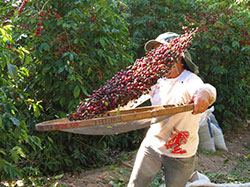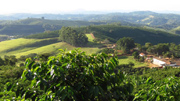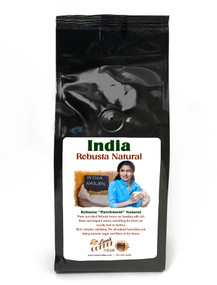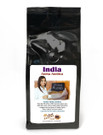- Home
- Coffee by Type
- Robusta
- India Organic Natural Robusta
India Organic Natural Robusta
New season! Robusta in India is grown in rich soil at altitudes higher than typical in the rest of the world, and lovingly cultivated to specialty coffee cupping standards. The parent plants were likely imported into India over a century ago from Sumatra, and they have the same chocolatey profile as beans brought into Indochina (including Vietnam) by French Jesuits circa 1890-1920. We are offering this coffee as a stand-alone single origin of exceptionally quality, and also creating some new blends in which the rich, earthy flavor of these beans will shine.
This Organic Robusta offering is sourced from the Sakleshpu and Coorg districts in Karnataka, India. Coffee is produced on high-altitude (~3700 feet) family-owned farms, many of which have been owned by the same family for generations. The region is extremely biologically diverse, with over 5000 species of flowering plants and 500 species of birds. We always source high-altitude Robusta, grown as specialty coffee, and this is why our Robusta offerings are equal in taste and quality to most specialty Arabicas. These beans have been sun-dried on outdoor beds. They are referred to locally as "parchment" process.
Roast Level: Our Chocolate Roast, which is a small step darker than medium, features a slow, extended development period after First Crack that brings out the maximum natural Chocolate tones of these beans. This is a great coffee to blend with others, too. It adds depth and back-palate presence to any Arabica or Arabica blend.
Certified organic by INDOCERT (Indian Organic Certification Agency).
8 ounce bags, please choose ground or whole bean.
Please note: We have held the price at $7.95 for 5 years but our costs for these beans are up 40%, so we reluctantly have added $.80 to the bag price.
Customer Reviews
-
 Delicious in a latte!
Delicious in a latte!
This is for a City Roast, which is lighter than the Chocolate Roast. Both are great, and Len responded to our request for a City Roast (not as dark), which we prefer for our coffee. Very low acid, mildly sweet, and a more "mellow" caffeine (brighter and not "jittery or nervous"). Brewed as a latte (expresso and foamed milk).
Posted by Robusta coffee fan in California on May 22nd 2024
-
 Smooth and full bodied.
Smooth and full bodied.
I am not good at describing fruity and chocolate notes, but I know I like full bodied coffee. Drip brewed, cream, no sweetener is how I drink this. I have bought this one several times, no weird funky flavor I keep getting in Arabica coffees.
Posted by Dawn F on Jun 9th 2022
Latest Blog Post

Get to know our Brazil Microlots!
These volcanic soil coffees are delicious and diverse... Read more...
Resources
Featured Region

The Araku Valley of India
India's coffee tradition goes back 400 years or more, when a variety called Kent was first established in the Southern Hills. Arabicas predominated until the blight of 1870, when growers needed to hybridize to resistant varieties. The resultant strains had genes from Liberica and other unique, resistant species. Learn more and browse India's Araku Valley coffees here.
 Loading... Please wait...
Loading... Please wait...











